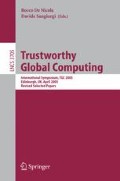Abstract
The security of a network protocol crucially relies on the scenario in which the protocol is deployed. This paper describes syntactic constructs for modelling network scenarios and presents an automated analysis tool, which can guarantee that security properties hold in all of the (infinitely many) instances of a scenario. The tool is based on control flow analysis of the process calculus LySa and is applied to the Bauer, Berson, and Feiertag protocol where is reveals a previously undocumented problem, which occurs in some scenarios but not in other.
An erratum to this chapter can be found at http://dx.doi.org/10.1007/11580850_20 .
Access this chapter
Tax calculation will be finalised at checkout
Purchases are for personal use only
Preview
Unable to display preview. Download preview PDF.
References
Armando, A., Basin, D., Bouallagui, M., Chevalier, Y., Compagna, L., Mödersheim, S., Rusinowitch, M., Turuani, M., Viganò, L., Vigneron, L.: The AVISS security protocol analysis tool. In: Brinksma, E., Larsen, K.G. (eds.) CAV 2002. LNCS, vol. 2404, pp. 349–353. Springer, Heidelberg (2002)
Bauer, R.K., Berson, T.A., Feiertag, R.J.: A key distribution protocol using event markers. ACM Transactions on Computer Systems 1(3), 249–255 (1983)
Blanchet, B.: An efficient cryptographic protocol verifier based on Prolog rules. In: CSFW 2001, pp. 82–96. IEEE, Los Alamitos (2001)
Bodei, C., Buchholtz, M., Degano, P., Nielson, F., Nielson, H.R.: Automatic validation of protocol narration. In: CSFW 2003, pp. 126–140. IEEE, Los Alamitos (2003)
Bodei, C., Buchholtz, M., Degano, P., Nielson, F., Riis Nielson, H.: Static validation of security protocols. JSC (2004) (to appear), Preliminary version at http://www.imm.dtu.dk/pubdb/views/edoc_download.php/3199/pdf/imm3199.pdf
Boyd, C., Mathuria, A.: Protocols for Authentication and Key Establishment. Springer, Heidelberg (2003)
Buchholtz, M.: Automated analysis of security in networking systems. Ph. D. thesis proposal (December 2004), Available from http://www.imm.dtu.dk/~mib/thesis/
Buchholtz, M.: Implementing control flow analysis for security protocols. DEGAS Report WP6-IMM-I00-Pub-003, Draft (2003)
Buchholtz, M., Nielson, F., Nielson, H.R.: A calculus for control flow analysis of security protocols. IJIS 2(3-4), 145–167 (2004)
Bugliesi, M., Focardi, R., Maffei, M.: Compositional analysis of authentication protocols. In: Schmidt, D. (ed.) ESOP 2004. LNCS, vol. 2986, pp. 140–154. Springer, Heidelberg (2004)
Comon-Lundh, H., Cortier, V.: Security properties: Two agents are sufficient. In: Degano, P. (ed.) ESOP 2003. LNCS, vol. 2618, pp. 99–113. Springer, Heidelberg (2003)
Denker, G., Millen, J., Rueß, H.: The CAPSL integrated protocol environment. Technical Report SRI-CLS-2000-02, SRI International (2000)
Durante, A., Focardi, R., Gorrieri, R.: A compiler for analyzing cryptographic protocols using noninterference. TSEM 9(4), 488–528 (2000)
Gordon, A.D., Jeffrey, A.: Authenticity by Typing for Security Protocols. In: CSFW 2001, pp. 145–159. IEEE, Los Alamitos (2001)
Information technology - security techniques - key management - part 2. mechanisms using symmetric techniques ISO/IEC 11770-2. International Standard (1996)
Lowe, G.: Casper: A compiler for the analysis of security protocols. JCS 6(1), 53–84 (1998)
Nielson, F., Nielson, H.R., Hansen, R.R.: Validating firewalls using Flow Logics. TCS 283(2), 381–418 (2002)
Nielson, F., Nielson, H.R., Seidl, H.: Cryptographic analysis in cubic time. In: TOSCA 2001. ENTCS, vol. 62. Elsevier, Amsterdam (2001)
Nielson, F., Nielson, H.R., Seidl, H.: A succinct solver for ALFP. NJC 9, 335–372 (2002)
Riis Nielson, H., Nielson, F.: Flow logic: a multi-paradigmatic approach to static analysis. In: Mogensen, T.Æ., Schmidt, D.A., Sudborough, I.H. (eds.) The Essence of Computation. LNCS, vol. 2566, pp. 223–244. Springer, Heidelberg (2002)
Stoller, S.D.: A bound on attacks on authentication protocols. In: Proceedings of the 2nd IFIP International Conference on Theoretical Computer Science (TCS 2002), pp. 588–600. Kluwer, Dordrecht (2002)
Author information
Authors and Affiliations
Editor information
Editors and Affiliations
Rights and permissions
Copyright information
© 2005 Springer-Verlag Berlin Heidelberg
About this paper
Cite this paper
Buchholtz, M. (2005). Automated Analysis of Infinite Scenarios. In: De Nicola, R., Sangiorgi, D. (eds) Trustworthy Global Computing. TGC 2005. Lecture Notes in Computer Science, vol 3705. Springer, Berlin, Heidelberg. https://doi.org/10.1007/11580850_18
Download citation
DOI: https://doi.org/10.1007/11580850_18
Publisher Name: Springer, Berlin, Heidelberg
Print ISBN: 978-3-540-30007-6
Online ISBN: 978-3-540-31483-7
eBook Packages: Computer ScienceComputer Science (R0)

